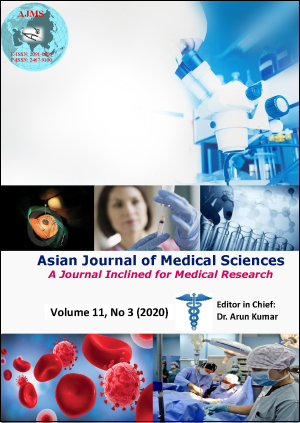Investigation of the frequency and distribution of Pychiatric comorbidities in patients with Mastalgia
Keywords:
Breast pain, Mastalgia, Psychiatric disorders, SomatizationAbstract
Background: Mastalgia defines pain that is located in or felt in the breast area. Pain can be a symptom in many psychiatric disorders. Therefore, considering the psychiatric disorders in the evaluation of patients with mastalgia is of great importance in terms of treatment success and pain control
Aims and Objective: In this study, we aimed to identify the psychiatric diagnoses that may be involved in the etiology of mastalgia and to retrospectively determine the frequency of patients who may need psychiatric treatment among the treatment options that can be used in patients with mastalgia
Materials and Methods: We included patients who presented with breast pain between August 2017 and August 2018 and had normal results of radiological imaging studies. The archive system of the hospital was screened for the presence of any psychiatric admission before the diagnosis and previous psychiatric diagnoses, if any, were recorded
Results: There were 1124 patients with mastalgia included in our study. Screening of psychiatric comorbidities recorded in the archive system revealed the presence of psychiatric admissions in 19.04% (n = 214) of the patients. Student's t-independent test showed a statistically significant difference between the mean age of mastalgia patients with and without psychiatric comorbidity
Conclusion: In our study, we demonstrated the presence of anxiety disorder as psychiatric comorbidity in a high percentage of patients (43.9%), which was consistent with the rates reported in the literature of somatic symptoms, which are associated with anxiety disorder.
Downloads
Downloads
Published
How to Cite
Issue
Section
License
Authors who publish with this journal agree to the following terms:
- The journal holds copyright and publishes the work under a Creative Commons CC-BY-NC license that permits use, distribution and reprduction in any medium, provided the original work is properly cited and is not used for commercial purposes. The journal should be recognised as the original publisher of this work.
- Authors are able to enter into separate, additional contractual arrangements for the non-exclusive distribution of the journal's published version of the work (e.g., post it to an institutional repository or publish it in a book), with an acknowledgement of its initial publication in this journal.
- Authors are permitted and encouraged to post their work online (e.g., in institutional repositories or on their website) prior to and during the submission process, as it can lead to productive exchanges, as well as earlier and greater citation of published work (See The Effect of Open Access).




